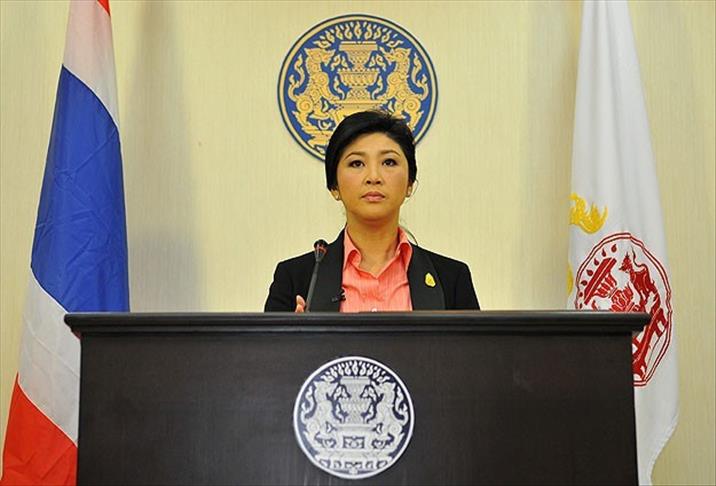
Former Prime Minister Yingluck Shinawatra's indictment by Thailand's anti-corruption commission has been celebrated with delight by the country's anti-government movement, which has been protesting on Bangkok streets for over six months.
For these protesters - mostly from the Thai elite and Bangkok's middle class - the Shinawatra political clan, with former Prime Minister Thaksin – Yingluck’s brother - at its helm, has created “a new kind of corruption.”
But some think the problem is a symptom of a much deeper malaise.
The anti-government People's Democratic Reform Committee (PDRC) has focused its campaign on the fight against corruption. On PDRC billboards, Thaksin and Yingluck are depicted as vampires on a quest for blood – an image that suggests the Shinawatra family is bleeding the country to death.
The family has dominated Thai politics for almost 15 years, Thaksin prime minister for five of them until he was overthrown in a coup in 2006.
Kobkarn Wattanavrangkul, director of the anti-corruption organization of Thailand, told the Anadolu Agency this week that corruption in the Kingdom has become even more prevalent in the last ten years.
"In the procurement of big projects, the level to pay under the table to get the project is [now] roughly 30 percent of the bidding amount,” she said.
Corruption is a long-standing issue in Thailand. Thai society functions on the basis of clientele networks, gift offerings and the collection of bribes deeply rooted in business mentality.
When dictator Marshal Sarit Thanarat died in 1963, the Thai public discovered he had accumulated 2.8 billion baht (then US$112 million) during his life - equivalent to 30 percent of the national budget at the time.
During the 95-97 reigns of prime ministers Banharn Silpa Archa and Chavalit Yongchaiyudh massive corruption repulsed Thailand's middle class, while to the rural and urban poor voting day was something that came with a 100 baht incentive and an instruction of which box to tick.
Numerous studies have described the sophisticated system established by the Thai police, through which bribes are collected by low-ranking officers, sent to the top of the hierarchy, and then trickled down through the entire network. Some describe it as its own economic system, while others are disgusted by a network where only a hierarchical few gain.
As is the case in many countries, collusion between politicians or civil servants and businessmen is frequent. An official typically marks up the cost of a project and then receives a kickback from the selected businessman. Academics still teach about the phenomenal amount of contracts allegedly signed during Banharn's last few hours as premier - the country said to be crippled for years after with projects it just didn't need.
But according to Anti-corruption head Kobkarn, the coming of the Shinawatras gave birth to more sophisticated means.
"Thaksin used the authority of his premiership to create a monopoly for his mobile phone company," he alleged.
Shinawatra family supporters deny that the coming to power of Thaksin in 2001 opened a new era of corruption.
“I strongly disagree with this. I'm not denying that corruption exists, but it was also on the side of the Democrat Party," Sean Boonpracong, adviser to former Prime Minister Yingluck, told AA on Friday.
"Some enemies of Thaksin even recognize that Abhisit Vejjajiva’s government was extremely corrupt,” he added, referring to Democrat Party leader Vejjajiva, now in opposition, who was prime minister from 2008-2011.
“There is a lot of talk of corruption by the Shinawatra family, but not a lot of evidence.”
In early 2006, Thaksin authorized a rise in the foreign shareholding in Thai telecommunications companies from 25 percent to 49 percent. A few weeks later, his family sold its entire stake in Shin Corporation to Singapore government investment company Temasek Holdings, Thaksin and his then wife's family using a regulation that made individuals who sell shares on the stock exchange exempt from capital gains tax to net around 73 billion baht (US$1.88 billion) tax-free from the sale.
The Kingdom - even some of his allies - disapproved, Thaksin accused of not just corruption but also of selling an asset of national importance to a foreign entity.
Some also see the rice-subsidies scheme, in which former Prime Minister Yingluck was indicted on Thursday, as “policy corruption.” Under the 2011 program, authorities purchased rice from farmers at a price 50 percent above market level.
“The price was too high. And the people who benefited were not the farmers, but the middlemen connected with the authorities,” alleged Kobkarn.
“The farmers were not getting richer, but they could not see that, because they didn't know how to put all the figures together. But we know because we are the ones who make the balance sheets.”
Some, however, consider that an exclusive focus on the Shinawatra clan - or even on the politicians - leads to an unbalanced assessment of corruption.
“Corruption in the civil service, in the military, in the police and in the Buddhist monastic community is very strong, and probably much larger than corruption among politicians,” Michael H. Nelson, a sociologist at Walailak University in southern Thailand, told AA.
“This whole issue of corruption is very one-sided. It is only used as a weapon against much disliked political opponents,” he said.
As if to illustrate the point, tens of thousands of anti-government protesters rallied in Bangkok on Friday to denounce corruption under the “Thaksin regime” – a clear indication that the Thai political turmoil is far from over.
englishnews@aa.com.tr


